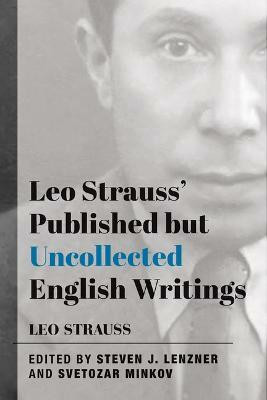Leo Strauss` Published but Uncollected English Writings(English, Paperback, Strauss Leo)
Quick Overview
Product Price Comparison
Any presentation of political philosophy in the 20th century is radically incomplete without Leo Strauss. The appearance of this collection is particularly important given the relentless but shifting interest in his influence and thought in recent years. Lenzner and Minkov contend that in order to evaluate Strauss's achievement properly, one must do so chiefly with reference to the works by which Strauss sought to establish his legacy-i.e., those he chose to submit for the consideration of future readers. The most complete record of Strauss's thought includes his books together with his other published and unpublished writings and lectures. The achievement of this volume is to present in one collection every piece Strauss chose to publish in English that he did not himself include in a collection or a book. The material is arranged chronologically so as to avoid undue categorization by the editors. Among the highlights of these works published between 1937 and 1972 are striking formulations not to be found in his books on the relationship between philosophy and society, which is perhaps the most prominent theme in Strauss's corpus taken as a whole; rare 'personal' statements that shed light on his self-understanding as a philosopher; his first writing devoted solely to a classical thinker ("The Spirit of Sparta or the Taste of Xenophon"); his first piece devoted to Plato, "On a New Interpretation of Plato's Political Philosophy," his most searching engagement with Jean-Jacques Rousseau; his first treatment of the thought of Niccolo Machiavelli and a wonderful, later treatment of Machiavelli's relation to ancient writers; and a critical review of a book on Xenophon's Hellenica. This complete collection of Strauss's scattered work in English is invaluable for those interested in the political philosopher, to be sure. But it is also an important contribution to the field in general as well as the history of philosophy.


